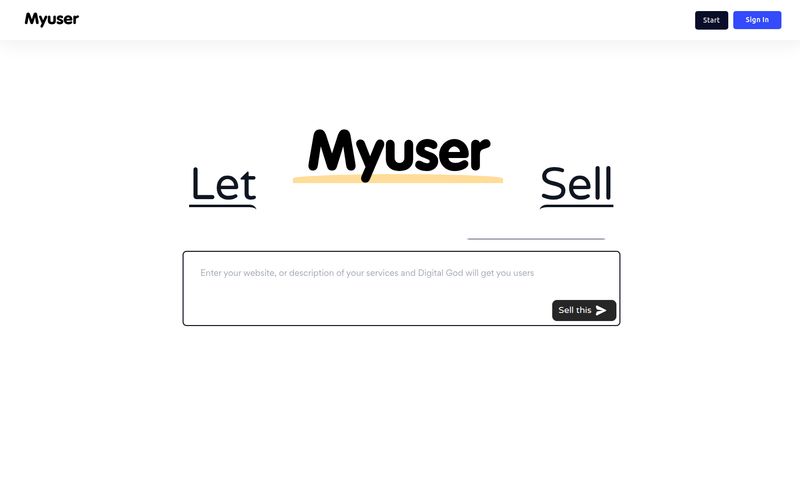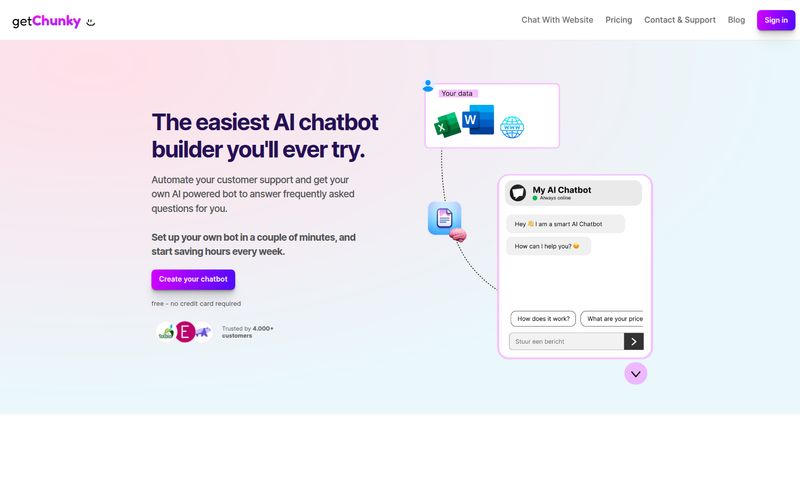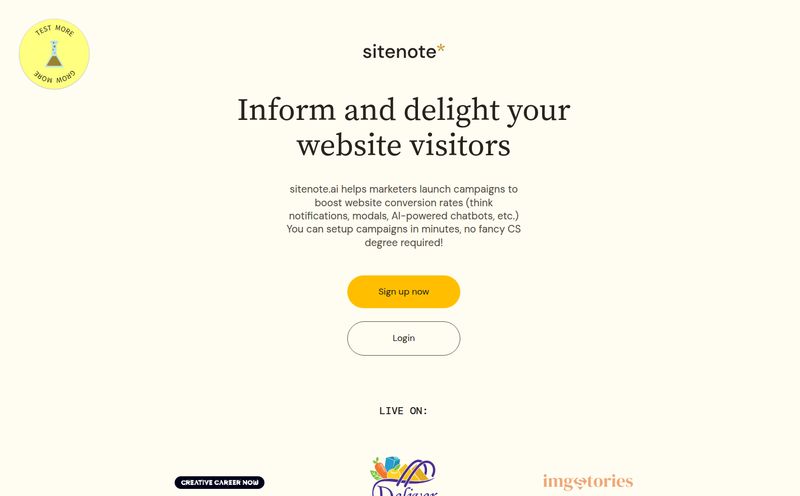I’ve been in the SEO and traffic generation game for a long time. I’ve seen fads come and go faster than you can say “algorithm update.” From the gold rush of guest blogging to the content-is-king era, the one constant is the creator’s relentless hunt for the next thing. The next traffic source, the next revenue stream, the next way to connect with an audience without cloning yourself and working 48 hours a day.
Well, what if you could clone yourself? Sort of.
I stumbled upon a new platform recently, MindRoomAI. The tagline is simple enough: “Create an AI clone of yourself from your content and monetize fan interactions.” It’s a bold claim, one that sits somewhere between brilliant and a Black Mirror episode plot. Naturally, I was intrigued. Is this the future of personal branding, or just another tech gimmick destined for the digital graveyard? Let’s talk about it.
What Exactly Is MindRoomAI?
At its heart, MindRoomAI is a platform for content creators and thought leaders. The idea is that you feed it your existing content—blog posts, video transcripts, social media rants, you name it—and it builds an AI model that learns to talk like you. It captures your voice, your opinions, your turns of phrase. It creates a virtual you. A digital twin.
Once your AI clone is born, you can unleash it on the world. Your fans, followers, or just curious strangers can then have a conversation with your AI. The kicker? You can charge them for the privilege. It’s an entirely new way to think about monetizing your expertise and personality, operating 24/7 without you ever lifting a finger. It's a pretty wild concept when you stop and think about it.
The Big Idea: Your Own AI Avatar
Why would anyone do this? My first thought was, “Isn’t this a bit… weird?” But the more I thought about it, the more it started to make a strange kind of sense. As a creator, your time is your most limited resource. You can’t possibly answer every email, every DM, or every comment. It's just not scalable.
An AI clone, however, can. It can handle thousands of conversations at once, offering personalized advice, answering questions, or just chatting with fans who want a piece of your time. It’s like having a digital ghostwriter for your DMs, trained on your own brain. This isn't just about passive income; it's about scaling presence and engagement in a way that's been impossible until now.

Visit MindRoomAI
Imagine being an author and having your AI discuss the themes of your book with readers. Or a business coach whose AI can give introductory advice to potential clients day and night. The potential is there, and it’s massive.
Getting Started with Your Digital Clone
So, I navigated to the MindRoomAI website, ready to dive in. And what I found was… well, not much. The landing page is incredibly minimalist: a logo, a tagline, and an email signup box to “be added to the creator list.” That’s it. There’s a search bar to look for existing models, but my searches came up empty, with a friendly “No results found. Why not make your own models?”
This tells me one thing loud and clear: this is ground-floor stuff. We are early. For some, a sparse site might be a red flag. For me, it’s exciting. It suggests they're focused on the tech, not the flashy marketing. Or they just haven't gotten around to the marketing yet. Either way, getting in now means you’re one of the first to experiment with a brand-new tool.
The Monetization Model Explained
This is where things get really interesting. How do you actually make money? The pricing examples they give are based on a per-word model for the user. It seems creators get to set their own rate. For example:
| Example AI Clone | Price to Chat |
|---|---|
| "Rusty" | $1 / 1000 Words |
| "Virtual Joe Youngblood" | $2 / 1000 Words |
This is a clever approach. A fan pays a small amount to chat with your AI, and the cost is based on the length of the conversation. I assume MindRoomAI takes a percentage of that fee, which is a standard SaaS model. It’s a low-friction way for fans to get value, and it allows creators to monetize their audience’s curiosity without putting up a hard paywall for content. The more engaging your AI, the longer people will chat, and the more you can potentially earn.
The Good, The Bad, and The AI
No tool is perfect, especially one this new. Let's break down what I see as the major pros and cons based on what we know so far.
The Bright Side
The most obvious advantage is that it’s a completely novel way to monetize your personal brand. It’s passive, scalable, and something genuinely different in a crowded market. The fact that it’s apparently free to create your model is a huge plus, lowering the barrier to entry to basically zero. You just need the content. The interface, from what little there is, looks clean and straightforward. No complicated dashboards or a steep learning curve. At least, that's the hope.
Some Lingering Questions
On the flip side, there are some big question marks. First and foremost, the quality of your AI is entirely dependent on the quality and quantity of the data you feed it. If your content is all over the place, your AI clone will be too. It’s the classic “garbage in, garbage out” problem. To get a truly convincing digital twin, you'll need a substantial and consistent body of work.
Monetization also hinges entirely on having an engaged fanbase willing to pay for this kind of interaction. If you’re just starting out, this probably isn't for you. And then there's the big one: data privacy and security. The site offers very little information on this. What happens to the content I upload? Who owns the resulting AI model? How is user data stored and protected? These are serious questions that need clear answers before I’d feel comfortable feeding my life’s work into teh machine.
My Experience (and the 'Oops' Moment)
I have to be honest, while clicking around the very minimalist site, I broke it. I hit a link and was greeted with a friendly, full-screen “Oops! That wasn’t supposed to happen.” message. And you know what? I wasn't even mad. I kind of smiled. It felt… human. It was a reminder that behind this ambitious AI platform are real people, building something new, and sometimes, stuff breaks.
It reinforced my feeling that MindRoomAI is in its infancy. It's not a polished, corporate, finished product. It's a work in progress, and there's a certain charm to that. It feels like an opportunity to be part of the beta test of a potentially big idea.
Who Is This Really For?
So, who should be signing up for the creator list right now? I don’t think this is for everyone. If your brand is highly visual and you don't produce a lot of text or spoken-word content, this might be a tough sell. But if you’re a writer, a blogger, a podcaster, a YouTuber who scripts their videos, or a coach with a library of training materials—basically, anyone with a deep well of content that defines your “voice”—this could be a game-changer. It’s for creators who have already built a world with their words and now want to let people live in it, just for a little while.
MindRoomAI FAQs
- How much does MindRoomAI cost?
- It appears to be free for creators to sign up and create their AI model. The cost is for the end-user, who pays a per-1000-word fee (set by the creator) to chat with the AI. The platform likely takes a cut of that revenue.
- What kind of content do I need to create my AI clone?
- You’ll need a solid backlog of content that reflects your voice and expertise. This includes things like blog posts, articles, social media posts, podcast transcripts, and video scripts.
- Is my data safe with MindRoomAI?
- This is currently the biggest unknown. The website doesn't provide detailed information on its data privacy or security policies. This is a critical factor to consider as the platform develops.
- Can I really make money with this?
- The potential is there, but it’s not guaranteed. Success will depend heavily on the size of your audience, their level of engagement, and how compelling your AI clone is to interact with.
- Is MindRoomAI just another chatbot?
- Yes and no. At a technical level, it is a chatbot. But its purpose is different. Instead of a generic customer service bot, it’s a highly personalized AI designed to emulate a specific person, creating a unique form of interactive content.
Final Thoughts: A Glimpse into the Future?
MindRoomAI is a fascinating proposition. It’s raw, it’s unproven, and it’s walking a fine line between innovation and gimmickry. But I can't shake the feeling that it's tapping into something significant about the future of content and personality. We’ve already digitized our thoughts into blogs and our faces into videos; digitizing our conversational persona feels like the next logical, if slightly unsettling, step.
I’ve signed up for the creator list. I'm not sure if my virtual clone will become a money-making machine or just a weird party trick, but I'm absolutely here for the experiment. For creators looking for the next frontier, MindRoomAI is a name to watch. It's uncharted territory, and that's always the most exciting place to be.
Reference and Sources
- The official website for the tool: MindRoomAI
- An interesting read on the creator economy from Forbes: The Future Of The Creator Economy



